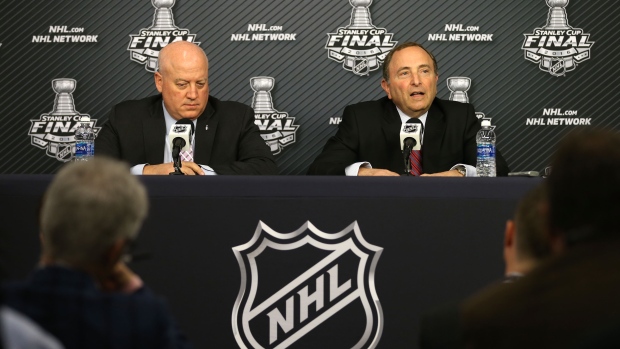Mar 15, 2018
Crucial hearing in NHL concussion suit coming Friday
More than four years after the landmark case was first filed, lawyers for the league and a group of disgruntled former players face off in court to argue over whether the litigation should proceed as a class action.

The National Hockey League concussion lawsuit is finally coming to a head.
More than four years after the landmark case against the NHL was first filed in U.S. District Court in Minneapolis, lawyers for the league and a group of disgruntled former players face off in court Friday to argue over whether the litigation should proceed as a class action.
If judge Susan Nelson decides to approve the case as a class action – a decision that might not come for many months – some 5,000 former NHL players would automatically become plaintiffs, hiking the stakes for the NHL and raising the league’s potential financial liability.
For the players, a loss would mean that the roughly 300 former players who have either filed a lawsuit against the NHL or retained lawyers to do so would have to argue their claims individually.
The hearing Friday is expected to last several hours. Lawyers for each side will have 30 minutes to make oral arguments about their respective cases. The judge will also hear arguments related to the NHL’s motions to exclude expert witnesses working for the plaintiffs.
During arguments over the case’s future as a class action, lawyers for the former players will likely underscore the emotion of the case, drawing comparisons between the NHL, which steadfastly refuses to concede a connection between head hits and long-term brain damage, and the tobacco industry, which for decades denied a link between its products and cancer.
Judge Nelson is a former trial lawyer who represented plaintiffs during tobacco-related personal injury lawsuits in the mid-to-late 1990s.
Plaintiff lawyers may also recap some of the NHL’s internal emails and documents, a paper trail that includes:
- A 2009 email chain where a top NHL lawyer suggested to commissioner Gary Bettman and others that the NHL not invest in researching the health of former NHL players and “focus on the here and now and leave the dementia issues up to the NFL!”
- Emails that show deputy commissioner Bill Daly in 2011 acknowledging a connection between head hits and fighting and long-term health problems such as depression.
- Emails showing the NHL quietly shut down its concussion study group in 2007 after researchers lost interest in the project and had not analyzed any data collected since 1997 because they were not being paid by the league.
- Emails from an unnamed NHL team doctor slamming the league for having “situational ethics” when deciding when players are held out of games after Chicago Blackhawks forward Martin Havlat returned to play during the 2009 playoffs two days after being knocked unconscious.
“This hearing is going to give the judge the opportunity to tell the parties and in many respects the players how she views the evidence,” said Charles Zimmerman, lead lawyer for the former NHL players, in an interview on Tuesday.
“The judge will have to comment and give her views on whose evidence makes the most sense. She’s going to have to decide if this case can proceed as a class action, which is highly significant to all of the players who don’t yet have lawyers, and on the strength of the science that we think supports the link between head hits in hockey and brain damage.”
Zimmerman said the hearing and subsequent judgment would be a watershed moment in the highly polarizing issue of head trauma and professional sports.
“The NHL has argued there is no science that shows the disease CTE or any other brain degenerative disease is connected to hockey,” Zimmerman said. “This is the first time the court has been confronted with that question in any sport in a contested basis. Football and the NCAA have both settled lawsuits before judge issued rulings on this. That’s why this is so significant.”
While judge Anita Brody in the NFL concussion lawsuit heard arguments about whether that case should have proceeded as a class action, she reserved her decision for more than a year. That had the effect of putting enough pressure on the NFL and the plaintiffs to reach a settlement in that case in 2015.
Since a settlement in the football lawsuit was reached, Brody never issued a legal judgment over the claims that repeated head hits are connected to long-term brain diseases.
Zimmerman and the plaintiffs have asked judge Nelson to establish two classes in a class action: one providing medical monitoring for players at risk of developing brain diseases and another for retired players who already have been diagnosed with disease such as dementia, Parkinson’s or Alzheimer’s.

